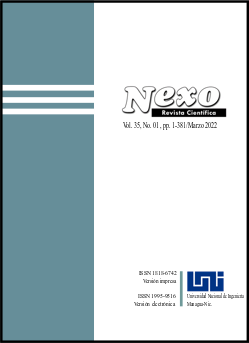Optimization principles for inlet portal designs of gravity fish outlets of fish protection structures of water intake facilities
DOI:
https://doi.org/10.5377/nexo.v35i01.13959Keywords:
inlet chamber, protective screen, fish outlet, inlet area, receiving chuteAbstract
Prevention of juvenile fish from entering water intakes for various economic purposes utilizing a fish protection structure design is associated with the need to divert protected juvenile fish (fish outlet) to a safe place of a water source while maintaining its viability. The development of principles for selecting fish outlet structural elements is based on the existing hydraulic and biological requirements to ensure the effective movement of fish outside the influence of water intake. For the conditions of an open gravity fish outlet, the features of functioning and possible ways of its central element optimization are considered: the inlet part, the receiving section, and the transition section. Based on the analysis of the most characteristic features of the flow formation in the zone of the water intake influence, the conditions for the layout of the inlet part of the fish outlet are determined. The technical solution of the receiving section is based on the design features and calculation of the hydraulic parameters of the pressure nozzles. Moreover, the structural elements of the receiving section should be a sequential combination of nozzles from the functional aspect: a conical confuser – a cylindrical nozzle- conical diffuser, and the hydraulic conditions should correspond to biological requirements and ensure a flowing current that is safe for fish; the analysis of hydraulic and technical conditions of fish outlet is given. From the standpoint of modern hydraulic and biological requirements and the knowledge of fish behavior patterns, the optimal design is proposed for the design of the inlet portal of an open gravity fish outlet of the fish protection structure of the water intake facility.
Downloads
Downloads
Published
How to Cite
Issue
Section
License
Copyright (c) 2022 Array

This work is licensed under a Creative Commons Attribution 4.0 International License.
The authors who publish in Nexo Scientific Journal agree to the following terms:
- Authors retain the copyright and grant the journal the right of the first publication under the license Creative Commons Attribution License https://creativecommons.org/licenses/by/3.0/, which allows others to share the work with a recognition of the authorship of the work and the initial publication in Nexo Scientific Journal.
- Authors may separately establish additional agreements for the non-exclusive distribution of the version of the work published in the journal (for example, in an institutional repository or a book), with the recognition of the initial publication in Nexo Scientific Journal.
- Authors are allowed and encouraged to disseminate their works electronically (for example, in institutional repositories or in their own website) before and during the submission process, as it can lead to productive exchanges, as well as earlier and greater citation of published works.











